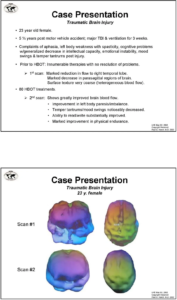Case control study: hyperbaric oxygen treatment of mild traumatic brain injury…
Paul G. Harch, M.D.,* Susan R. Andrews, Edward F. Fogarty, Juliette Lucarini, and Keith W. Van Meter
Abstract
Mild traumatic brain injury (TBI) persistent post-concussion syndrome (PPCS) and post-traumatic stress disorder (PTSD) are epidemic in United States Iraq and Afghanistan War veterans. Treatment of the combined diagnoses is limited. The aim of this study is to assess safety, feasibility, and effectiveness of hyperbaric oxygen treatments (HBOT) for mild TBI PPCS and PTSD. Thirty military subjects aged 18–65 with PPCS with or without PTSD and from one or more blast-induced mild-moderate traumatic brain injuries that were a minimum of 1 year old and occurred after 9/11/2001 were studied. The measures included symptom lists, physical exam, neuropsychological and psychological testing on 29 subjects (1 dropout) and SPECT brain imaging pre and post HBOT. Comparison was made using SPECT imaging on 29 matched Controls. Side effects (30 subjects) experienced due to the HBOT: reversible middle ear barotrauma (n = 6), transient deterioration in symptoms (n = 7), reversible bronchospasm (n = 1), and increased anxiety (n = 2; not related to confinement); unrelated to HBOT: ureterolithiasis (n = 1), chest pain (n = 2). Significant improvement (29 subjects) was seen in neurological exam, symptoms, intelligence quotient, memory, measures of attention, dominant hand motor speed and dexterity, quality of life, general anxiety, PTSD, depression (including reduction in suicidal ideation), and reduced psychoactive medication usage. At 6-month follow-up subjects reported further symptomatic improvement. Compared to Controls the subjects’ SPECT was significantly abnormal, significantly improved after 1 and 40 treatments, and became statistically indistinguishable from Controls in 75% of abnormal areas. HBOT was found to be safe and significantly effective for veterans with mild to moderate TBI PPCS with PTSD in all four outcome domains: clinical medicine, neuropsychology, psychology, and SPECT imaging. Veterans also experienced a significant reduction in suicidal ideation and reduction in psychoactive medication use.
Click here for full study

